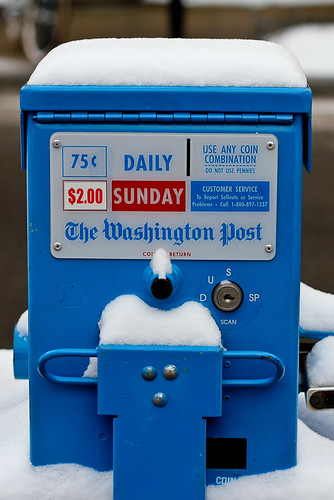Washington Post, what happened to you? You’re the paper of Woodward and Bernstein, a beloved local institution and a veritable fourth branch of government.
Coming home after a Saturday night carousing, I used to love to see the trucks lined up outside your building on 15th Street. Back then (the 90s), the paper was printed right next to the Post’s HQ. Blue trucks would be double-parked along the street, waiting to deliver the news to the region.
And if I stayed out late enough, I could pick up the fat slab of Sunday’s paper while it was still technically Saturday night. There was a weird thrill to this, getting the news ahead of everyone else. The Sunday paper was an event, something everyone read.
This is all gone now. Where once stories were reported, fact-checked, edited and edited again before the presses rolled, news these days emerges in electronic form, often-rushed and incomplete. This is a good thing. I am for more news, more information, for the great cornucopia of the web. No more gatekeepers, let the public decide what matters.

But the Washington Post is an institution. It is a brand expressing journalistic quality and integrity. When they publish something, I expect it to be true.
I don’t expect the Washington Post to be running a digital sweatshop, where young journalists are expected to churn out regurgitated news items in the mad pursuit of impossible traffic goals.
How does this fit into the great tradition of the Post? The strength of the paper is its ability to really delve into issues. Why are they trying to be like some smarmy blog?
And getting a few hits on your site – what is that really winning you? Traffic rushes in to click on a link and then rushes off to some other site.
At the What’s Next DC conference, I watched Katharine Zaleski, the paper’s digital news director, give a presentation on the strategy. Coming from the Huffington Post, she brought a relentless focus on metrics. News was to be measured. And the measurement was site traffic. She had charts showing how traffic to the site had increased as the Post increased its “buzziness,” with efforts like news aggregation and blogging.
Does the Washington Post really want to emulate The Huffington Post? Do they want to “surf the trend waves on the Internet”? Shouldn’t the paper be making waves rather than trying to catch them?
And are ephemeral bursts of web traffic the right metric to follow? If so, why not just turn your site over to cat videos? But the Post is more than that, isn’t it?
Stay true to your mission – quality journalism. It’s what you do best. Stop trying to be cool. Don’t go for viral. Avoid “buzziness” and all its advocates.
Instead, simplify. Be the Apple of newspapers. Don’t add more web gimmickry to your cluttered and unusable web site. Focus on what you do best.
Don’t measure web hits – look at engagement. How long do people stay on the site? How many stories do they read? Try to duplicate the loyalty readers once felt toward the paper that they lovingly held in their hands. Better to have 100,000 devoted readers than a million casual followers.
No more second-rate social media. It’s beneath you, Washington Post. Simplify, focus on your strengths and pursue engagement with readers to be true to your news-breaking legacy.
I love the Sunday newspaper no mattered where I lived. As a child in Detroit and as an adult in Chicago the Sunday paper is one of lifes pleasures not to be matched by the blogs. It is hard to curl up with your lap top and read the Huffington Post.
Let the papers be a paper with its coupons, comics,”lifestyle sections”,sports, target flyers and all manner of info.
I do not read the Washington Post but do read the Orlando Sentinel every day and Sunday too. I then go on line and catch up with all the rest.